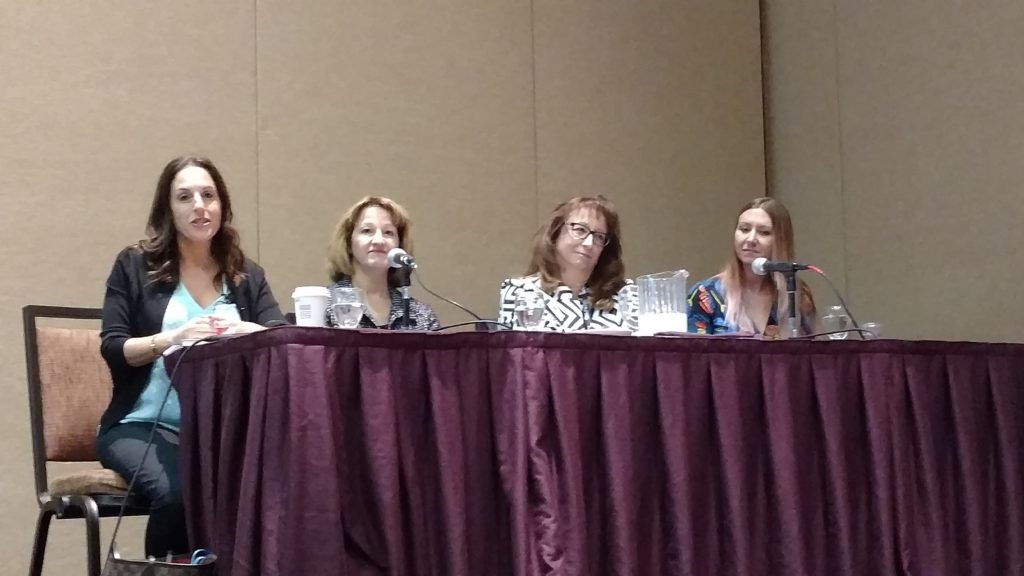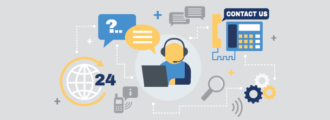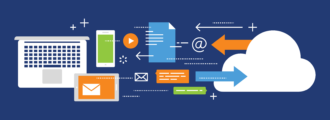I began hearing about the Women in IT events before even arriving at the conference this year—it was easily one of our team’s favorite sessions at Collaborate last year, and it didn’t disappoint. There were two events, a Women in IT luncheon and a panel discussion where participants would offer advice to women in IT. I arrived at the discussion a bit early anticipating a good session, but a bit unsure about where the conversation would go.
The session was organized as a Q&A with a panel of four women in the industry: Denise Grills, Vice President of Content and Communications Engineering with Oracle, JD Edwards; Kathleen Fauerbach, Account Manager, City of Las Vegas; Michelle Kolbe, Consultant, Red Pill Analytics; and Andee Harris, Chief Engagement Officer, High Ground.
The session began with each of the women on stage introducing themselves and sharing a bit about their experience as women in IT and then took questions from the audience. Once the floor opened for questions, they didn’t stop until the session was over.
From “Who is a leader in your career you want to emulate?” to “How do you work to mentor women in STEM?” the audience was full of questions—and the panel had answers. Here are just a few of the topics that came up and their advice to women in IT.
Leadership Skills Worth Cultivating
Denise shared her respect for her Vice President’s emotional intelligence. She said he doesn’t react too quickly; if something big happens, rather than firing off an emotional email, he responds with “Let’s talk about this in our next one-on-one.” The panel, in general, agreed that it was important that women don’t forget that we can still learn important skills from the men in leadership around us. In particular, Denise’s description of his “cool head” approach to problems struck a chord with me; it’s a skill I’m always seeking to improve.
Michelle mentioned a female leader on an all-male team who was particularly passionate about mentoring other women in IT and who had a huge impact on her life. This particular woman, Michelle said, would make a point to pull other women into meetings to observe or sit down to do lunch and mentor pretty much any woman who asked. It was an important reminder that we can all make a difference and help encourage others and that sometimes it’s as simple as sharing a meal and being open to answering questions.
Kathleen also shared an important takeaway in response to this question. She shared the example of their city manager, who knows how to lead and can do it forcefully if needed. But, she says, their city manager really listens in meetings, even to opposing viewpoints. Her biggest recommendation for others? Don’t be afraid to have a contradictory opinion. You don’t need to push it, but you do need to state it.
Ageism and Sexual Harassment in Tech
This was a major topic of discussion during the session. All too often, companies look at younger generations as more tech-savvy and cheaper labor. A member of the audience shared how a recruiter had her remove dates from her resume to prevent potential employers from guessing her age and to help her be more competitive. A younger attendee shared that companies seemed not to want to hire younger women, either, worried that they were of childbearing age.
While no one had any hard and fast advice for combating ageism, when it came to sexual harassment, the advice was clear: document it, however you can. And if it’s clear harassment, report it. Even if it might hurt your career. When the harassment is less clear, the group still had some good suggestions for responding appropriately. From having a casual conversation with HR (without filing an official complaint) to approaching the offender directly and saying something like, “I know you didn’t mean to do this and I really respect you, but this concerned me.”
Sharing Ideas And Being Heard
A recurring theme that came up in a number of questions was around how to be heard when sharing ideas in a group or presenting, without getting dismissed just because you’re a woman.
Michelle, who has pink and blonde hair, shared that she found when presenting on technical topics people would automatically dismiss her because of her appearance. Her solution? Immediately share code-heavy slides, to prove she knew her stuff. The other advice that came up was along similar lines. Kathleen recommended making sure you’ve done your research and walk into the meeting with facts to back up your suggestions and ideas. And Andee summed it all up nicely. She said, “Don’t get furious, get curious.”
Final Advice to Women in IT
At the end of the session, I raised my hand and asked the panel if they could each share one thing they really wanted the audience to take away from the discussion that day.
Denise said she wanted to encourage everyone to ASK. She said to practice it, and be ready. All too often others around you are asking, and even if you’re the most qualified, if someone else asks first they’re more likely to get a “Yes.”
Kathleen wanted to emphasize the importance of continuing education. “Never stop learning,” she said—always remember to push yourself.
Michelle encouraged women to be confident. She said when she mentors younger women interested in STEM, she asks them, “How’s your star power shining today?” and reminds them not to talk themselves out of anything—let someone else talk you out of it. Talking yourself out of things will get you nowhere.
And Andee rounded out the discussion with three words she hopes attendees will say to themselves:




